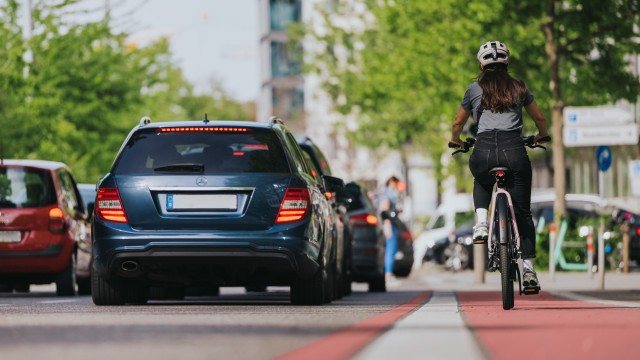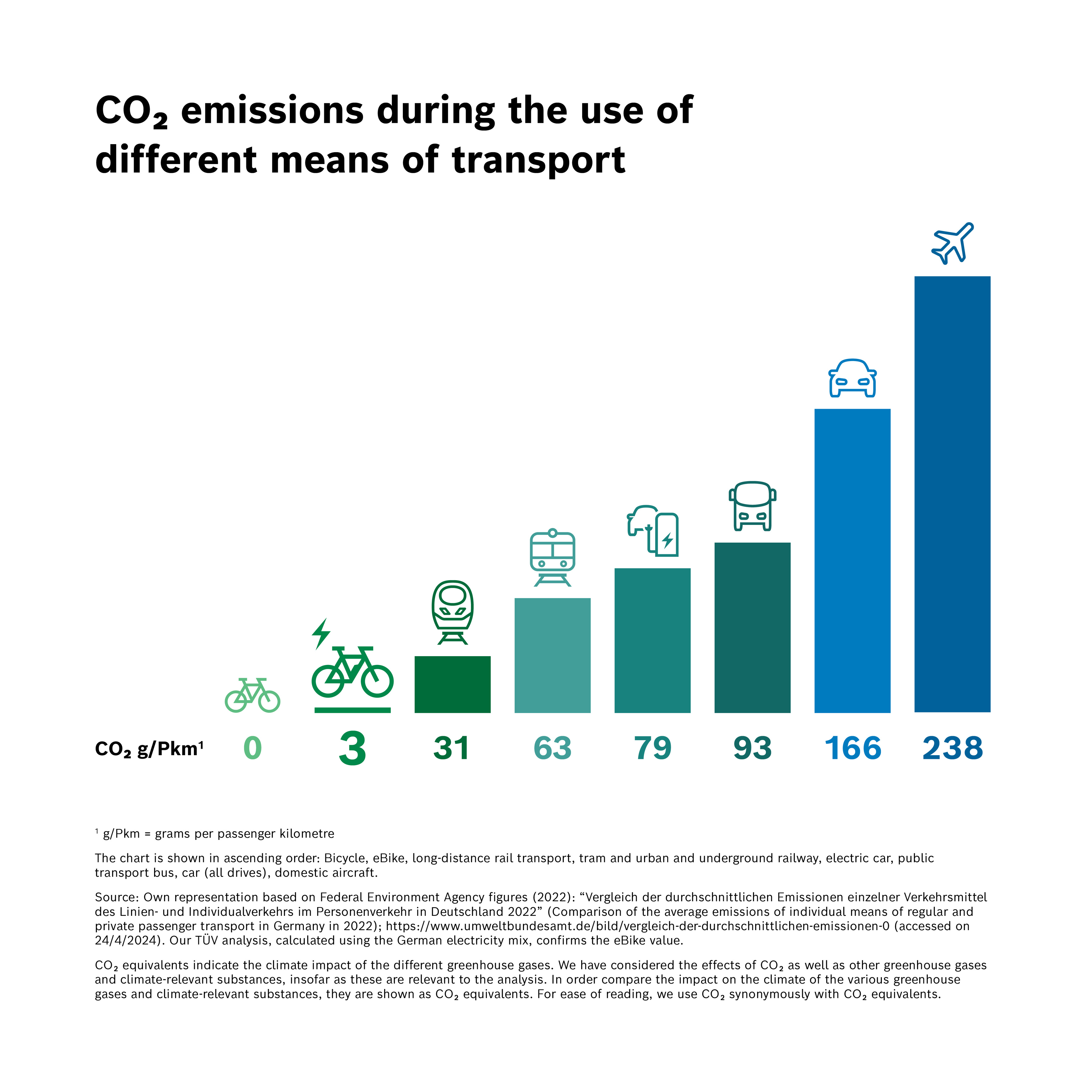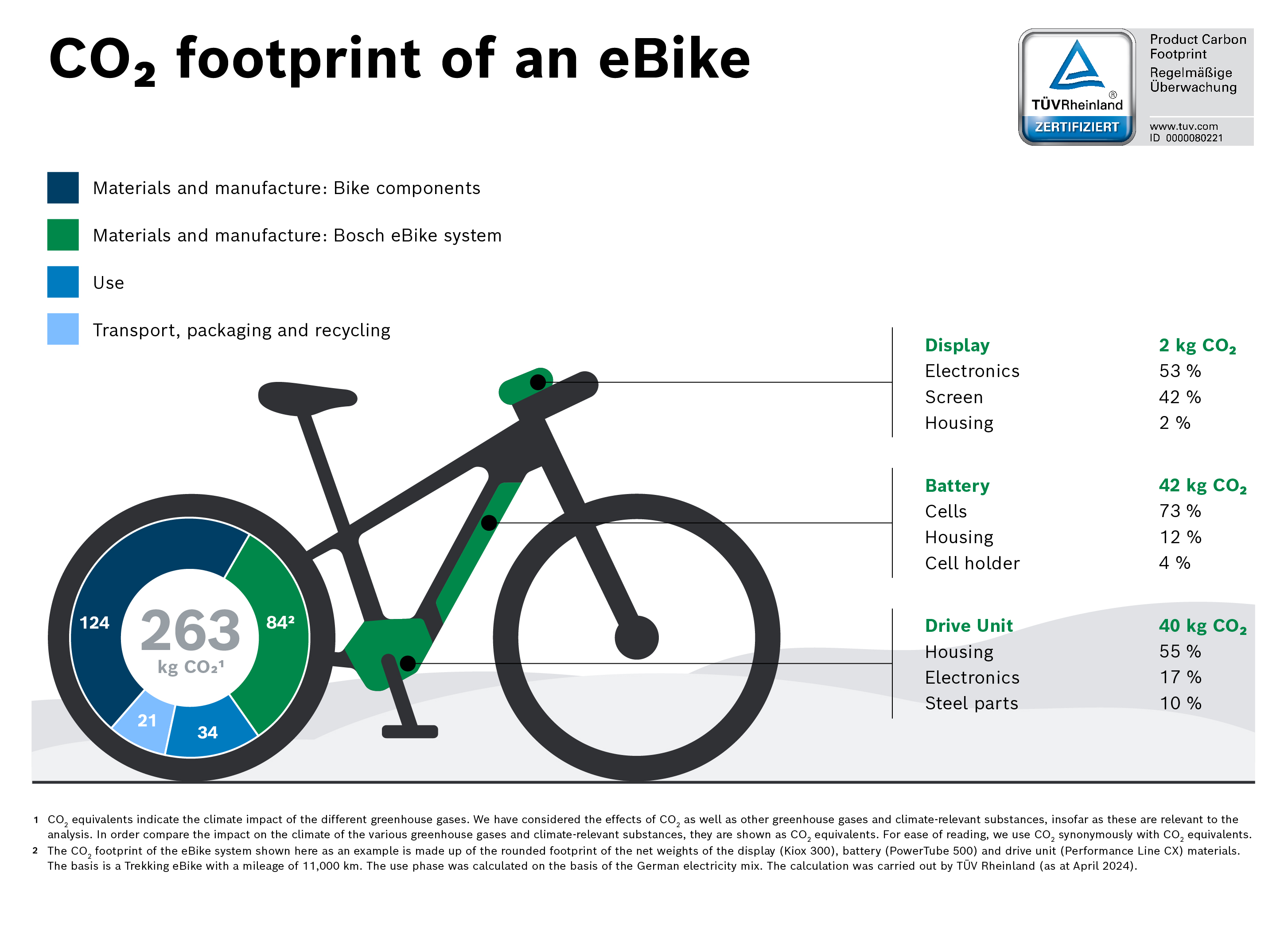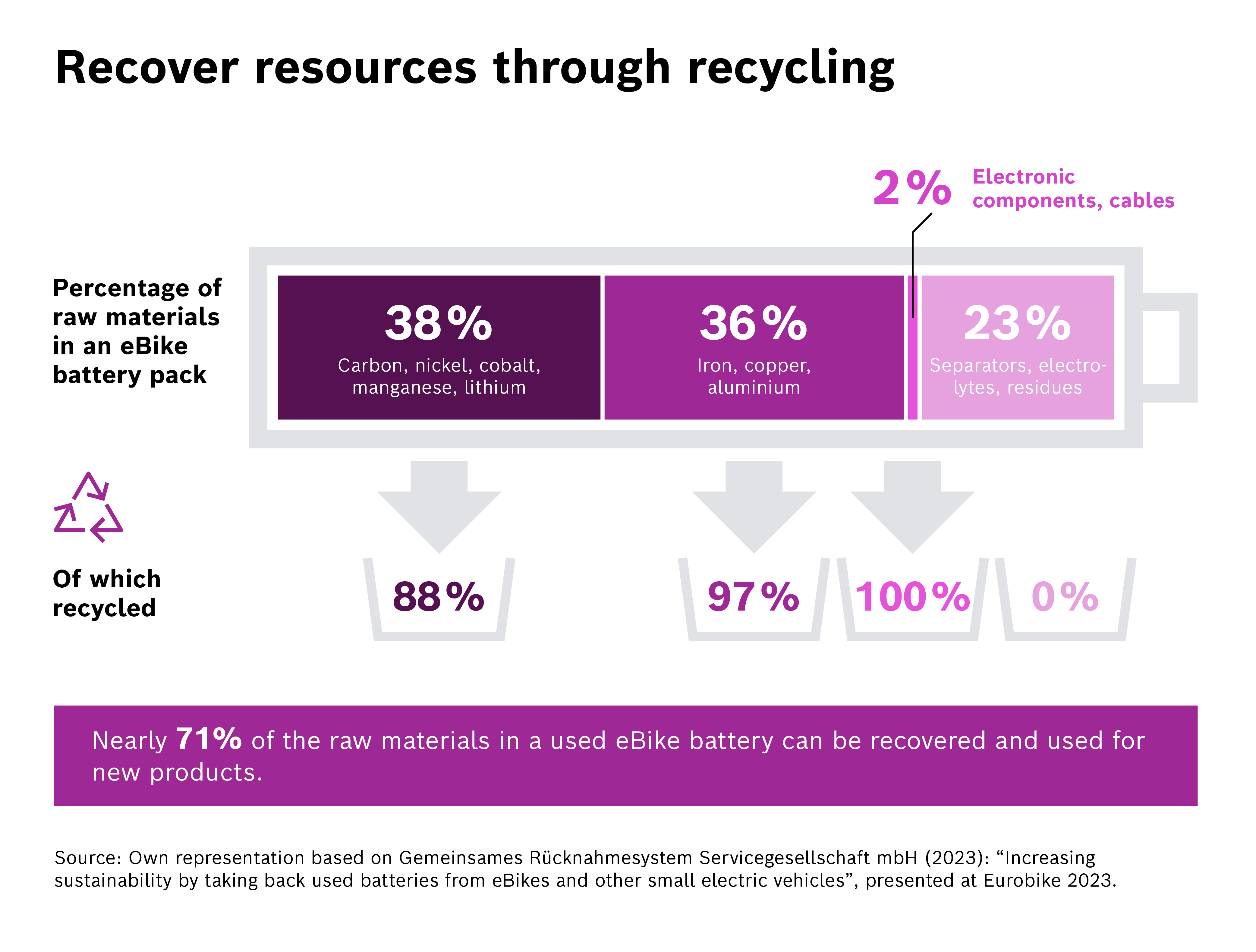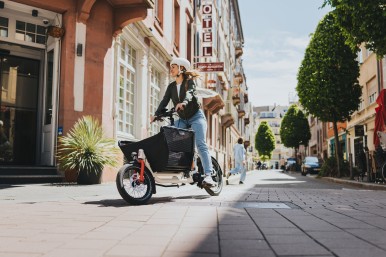As an evaluation by the Federal Environment Agency shows, the eBike is one of the lowest-emission means of transport. When using an eBike, the electricity consumption results in average CO₂ emissions of 3 g CO₂/person-kilometer (pkm), depending on the electricity mix. In comparison, a motor vehicle with an internal combustion engine emits about 166 g CO₂/pkm, while public transport emits between 58 and 93 g CO₂/pkm4. eBikers using the smart system from Bosch can now view their CO₂ savings compared to a car after every ride via the activity tracking function of the eBike Flow app5.
"Bosch eBike systems are already driving a society in which people are travelling more sustainably. With our products and solutions, we make a contribution to future-proof mobility. It is also important to us to continue to improve our eBike systems in terms of sustainability throughout the entire product life cycle," explains Claus Fleischer, CEO of Bosch eBike Systems. "Because sustainability is not an additional task, but an integral part of our corporate culture."
From vision to realisation: Bosch eBike Systems focuses on three pillars of sustainability
Bosch eBike Systems has defined three pillars of sustainability and firmly anchored them in its strategy:
- The "Carbon footprint" pillar aims to measure, identify and reduce CO₂ emissions at company, product and material level.
- The "Responsibility in the supply chain" pillar defines measures to ensure that all materials and primary products are selected sustainably and responsibly and that social standards are adhered to.
- The "Circular economy" pillar is concerned with the goal of extending the service life of products, i.e. reusing raw materials and further increasing recycling efficiency, for example.
For Bosch eBike Systems, the pillars are strategic guard rails that contribute to a common goal: to make eBike systems even more future-proof. To achieve this goal, the company derives specific measures that are implemented both internally and externally in collaboration with partners and suppliers.
CO₂ analysis focusing on savings potential
To intensify efforts to reduce emissions, Bosch eBike Systems, together with TÜV Rheinland, conducted a holistic analysis of the eBike's carbon footprint in 2022 and refined and updated it in 2024. Using the results of the analysis, the company has calculated the carbon footprint for each product in its portfolio. The aim of the analysis was to identify and evaluate the greatest CO₂ savings potential that can be found both in the system components and in the entire supply chain.
Around 79 percent of an eBike's CO2 emissions are caused by the materials used and in production, and 13 percent through use. The remaining eight percent is accounted for by transport, packaging and recycling.
Overall, an eBike has an average carbon footprint of 263 kg of CO₂ equivalents over its entire life cycle. If the eBike components are considered individually with approximately 84 kg of CO₂ equivalents, approx. 50 percent of the emissions are attributable to the battery, 48 percent to the drive unit and 2 percent to the display. If you ride around 515 kilometers on an eBike instead of using a motor vehicle with an internal combustion engine, the Bosch eBike system will have already paid for itself in terms of CO₂ consumption.
The CO₂ savings potential identified in the display are the electronic components (53 percent) and the screen (41 percent). In the drive unit, the housing accounts for the largest share of CO₂ at 55 percent, followed by the electronic components at 17 percent. In the battery, the greatest savings potential comes from the cells, which account for 73 percent of the CO₂ emissions, followed by the housing at 12 percent and the cell holder at four percent.
Reducing emissions along the entire supply chain
In the purchasing process, the carbon footprint is an important decision-making criterion when it comes to supplier selection, alongside other sustainability criteria. For this purpose, the CO₂ emissions of the materials used and purchased parts are requested from suppliers.
Claus Fleischer emphasises: "The joint analysis with TÜV Rheinland has shown us which areas we can and will prioritise to further reduce the carbon footprint of our eBike systems. Our measures focus on optimising materials and reducing emissions in production and the supply chain. Together with our partners and suppliers, we are making enormous efforts here, which are gradually paying off."
In the production of the new Bosch CompactTube 400, for example, the company uses alternative materials for the cell holders, which make up the largest plastic parts within the PowerTubes, in order to reduce the carbon footprint. For this purpose, a plastic is used whose emission factor is 64 percent lower than that of the plastic previously used. This material change will in future become the standard for all Bosch eBike Systems batteries integrated within the frame.
Beyond material and product level, Bosch eBike Systems also focuses on the corporate carbon footprint of its direct suppliers and makes this an important decision-making criterion in the purchasing process. By participating in the global system for the disclosure of environmental data provided by the non-profit organisation CDP, the company can record and assess the efforts of its direct suppliers to take climate protection measures. The aim is to make climate protection the standard: Suppliers that have a low CDP ranking and do not commit to the goals of the Paris Climate Agreement through an SBTi voluntary commitment6 will be given a lower rating in the purchasing process. Suppliers that disclose via the CDP currently account for 97 percent of the purchasing volume of Bosch eBike Systems – this figure is set to rise to 100 percent by 2025.
An important factor for reducing CO₂ is the use of green electricity. Bosch eBike Systems expects its suppliers to switch their production to electricity from renewable sources in order to reduce their emissions.
Responsibility and transparency as selection criteria in the purchasing process
Bosch eBike Systems places great value on the transparency and traceability of its supply chain, particularly with regard to batteries. In doing so, Bosch eBike Systems goes beyond the legal obligations stipulated by the Supply Chain Act and not only checks and qualifies its direct suppliers, but also endeavours to understand the entire supply chain in order to avoid potential risks in the procurement of raw materials. This applies in particular to the raw materials in the battery cells, which are comprehensively traced back to the mines. This approach will also be extended to the drive unit and displays in the future.
With regard to environmental protection, Bosch eBike Systems expects its suppliers to set up and develop an environmental management system in accordance with ISO 14001. As of this year, 100 percent of our direct suppliers have appropriate certification.
Circular economy: Remanufacturing & recycling at the end of the product life cycle
For Bosch eBike Systems, the high quality, safety and long service life of its products are paramount. The useful life of an eBike and the number of journeys with other modes of transport it replaces make a significant contribution to reducing the impact on the environment. Nevertheless, it is inevitable that the products will reach the end of their lifetime at some point.
This is where the circular strategy comes in, with which Bosch eBike Systems aims to improve the sustainability of products throughout their entire life cycle. This includes the procurement, production, utilisation, return, reprocessing and recycling of materials.
Since 2014, Bosch eBike Systems has been investing specifically in the recycling of its drive units through remanufacturing. Defective Bosch eBike drive units that qualify after testing are subjected to a detailed reconditioning process. They undergo a complete technical overhaul and are made available to dealers with full functionality after a final test.
"With our commitment to remanufacturing, we are sending a clear signal of our commitment to protecting the environment and promoting sustainable mobility – and have been doing so for over 10 years now," says Claus Fleischer. Further drive units will be added to the remanufacturing portfolio this year.
To be able to reuse valuable raw materials at the end of their lifetime, batteries need to be recycled properly. Bosch eBike Systems supports new and sustainable recycling methods worldwide. The efficiency of recovery depends on the recycling process. In the processes used by the German GRS industry solution, almost 71 percent of many valuable raw materials can be recovered7 and can be reused for new products.
In future, Bosch eBike Systems will increasingly focus on the use of recyclates in its circular economy.
In all sales countries where it is legally possible, Bosch eBike Systems voluntarily assumes responsibility for recycling obligations and the associated costs through local service partners. In countries where recycling solutions are not yet available or existing recycling solutions are inadequate, Bosch eBike Systems works closely with its partners, promotes pilot projects and supports the development of industry solutions. The company currently supports battery collection systems in 18 countries, including the Czech Republic and the United Kingdom as of this year.
Moving forward together
Through its measures, Bosch eBike Systems contributes to the overarching sustainability goals of the Bosch Group. With more than 400 locations worldwide, the Bosch Group has been carbon-neutral overall since 2020 (Scope 1 & 2)8. At the same time, the company intends to shape climate protection beyond its direct sphere of influence and also systematically reduce upstream and downstream emissions – the aim is to reduce emissions by 15 percent by 2030 (Scope 3).
"We are aware that we still face a number of challenges on our path to a sustainable future. Responsible and sustainable behaviour is very important to us as a company and is already daily practice in many areas at Bosch eBike Systems. Both small and large improvements have already had a positive impact – and we want to achieve more and more of these in the future," says Claus Fleischer.
